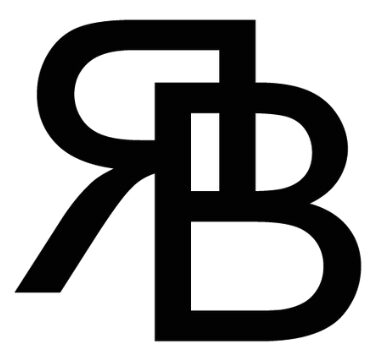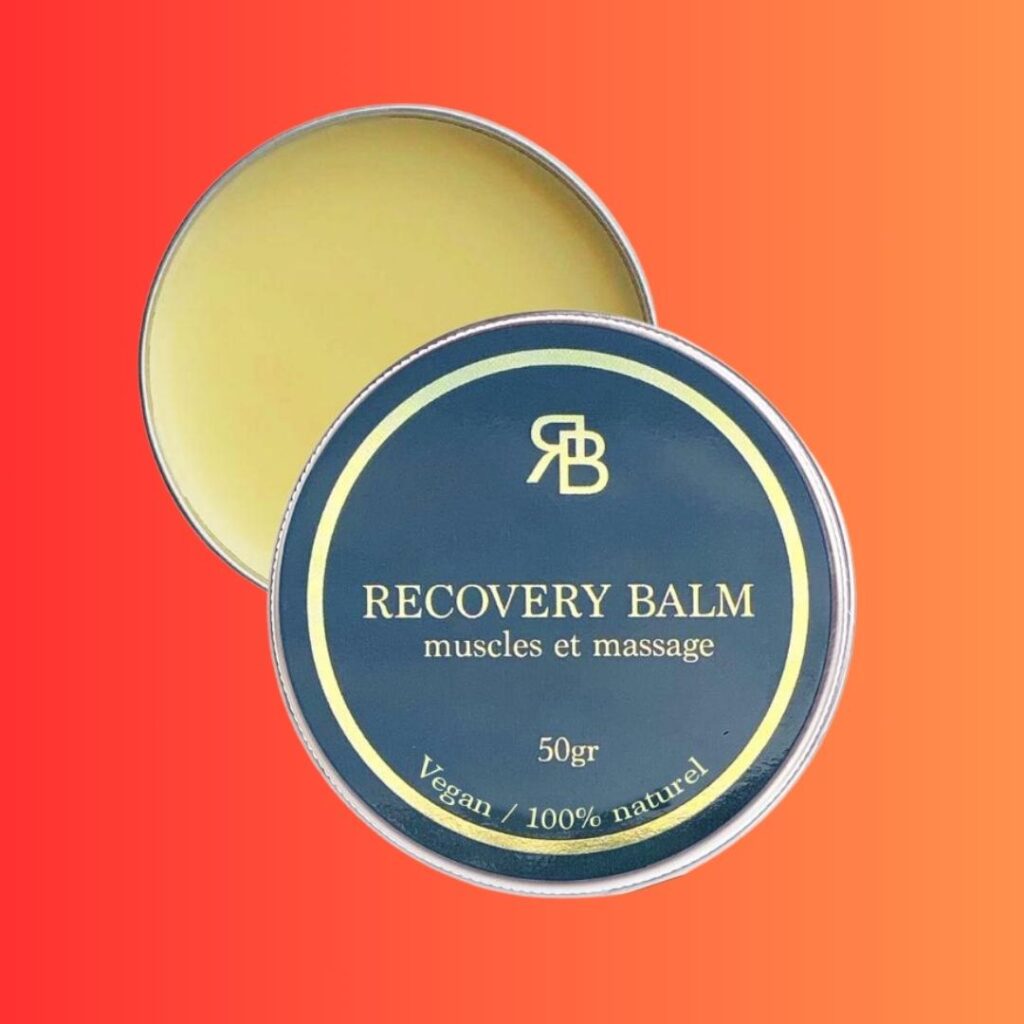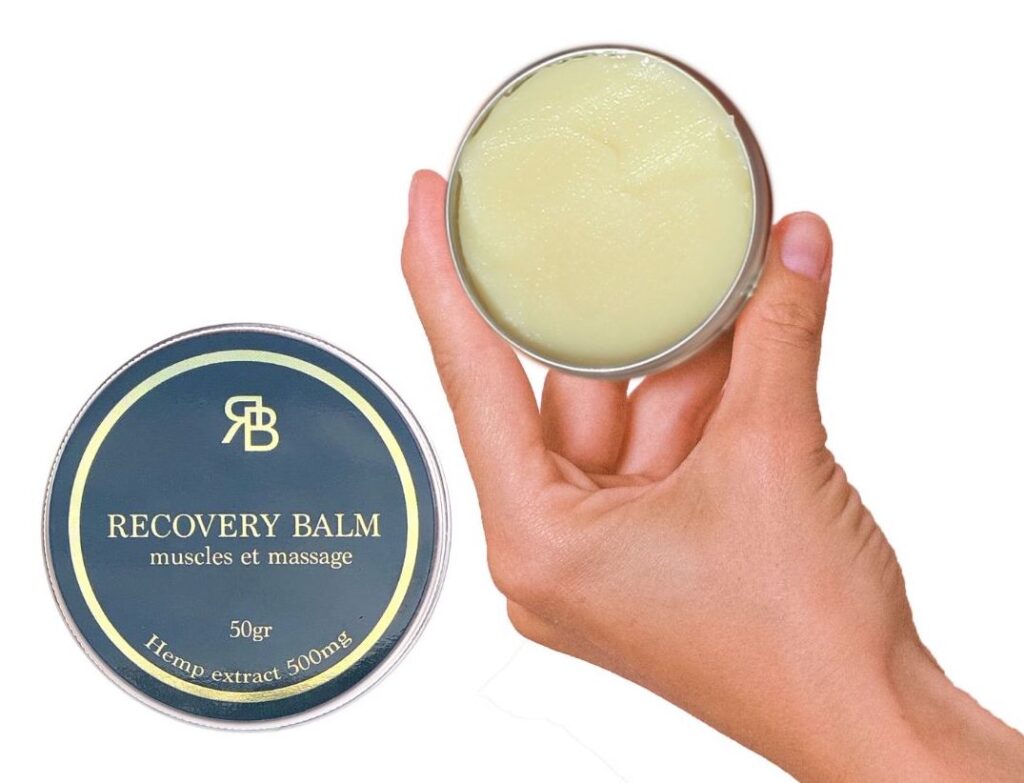Massage Techniques For Runners and Your Support Crew
Working with expert massage therapist, Ruth Martin @equilibrium.massage.fitness, I’m thrilled to share some straightforward massage techniques that you, along with your support crew, can employ while trail racing.
These methods aim to alleviate muscle tension, boost circulation, and keep you feeling refreshed during the race or even on long training runs.
For those who prefer a visual guide, with the help of EQUILIBRIUM Massage and Hästko sports underwear, we have put together some video demonstrations to show these techniques in action.
If you’re keen to dive deeper, we have an upcoming live clinic 10-11.30am on Monday 28th August 2023 at the beginning of the UTMB week in Chamonix.
Focusing on Shoulders, Knees, Pecs, Arms and Lower Back…
Massaging The Adductors Can Relieve Hips And Lower Back Tension

During a run, massaging the adductors, as well as the inner leg muscle complex, can help alleviate the tightness felt in hips and lower back. Essentially restoring fascia fluidity within the inner-leg muscles helps reduce the correlated tension patterns that occur through the fascial continuity in the pelvic girdle and lower back.
Ideally using heel of hand, with a well-aligned arm, sink in steadily to connect with the deeper tissues then push with mindful pressure along the length of the adductors, from the top of the leg, towards the knee, perhaps as if you are carefully rolling out pastry. You can use the Recovery Balm with a combination of long waves of pressure and more localised, cross-fibre strokes.
Massaging Lower Leg Muscles:
E.g. Soleus, Gastrocnemius, Tibialis Posterior and Peronei

Calf muscles prefer a softly-softly approach to massage, if you don’t want them to over-react. Quite often we don’t realise how tense they are, until someone squeezes the muscle. But it’s worth addressing the over-tense areas in the lower leg… as this improves freedom of movement globally through the body, and even can indirectly help relieve tension in the hip.
Gastrocnemius (Calf Muscle) Massage:
– Glide your hands up or down the back of your lower leg.
– Gradually increase the pressure, use your thumbs to apply deeper pressure.
– As you press into the calf muscle, search for any tender spots or knots, apply sustained pressure for 20-30 seconds, or until you feel a release or decrease in tension.
– Use a combination of long strokes and more focused pressure on specific areas of tension.
– Apply the Recovery Balm to help your finger glide, and for its anti inflammatory benefits.
Peroneus Longus Massage:
– The peroneus longus and other peronei muscles run along the outer side of the lower leg.
– Use the same techniques as with the gastrocnemius
– Gradually delve into deeper tissue work, being mindful NOT to push against or through any resistance from the tissue. The peroneus longus is closer to the surface, so you might feel tenderness more quickly.
Tibialis Posterior:
Note that this muscle, running down the inside of the tibia bone, towards the ankle, and part of the “posterior compartment”, ends up working hard as an ankle stabiliser. Give the posterior compartment some steady TLC with your Recovery Balm. Steady downward strokes, e.g. with reinforced fingers are best.
Oscillation

Easy for supports crew to do, oscillation techniques in massage involve rhythmic rocking or shaking movements.
It affects the para-sympathetic nervous system (fight or flight) so we are mimicking what happens to a mammal or our body’s system post flight or fight.
Oscillating the thighs is a great way to relax and recalibrate the quadriceps and hamstrings, that are heavily used during running. The rhythmic movement can release tightness, to improve overall muscle function.
Relieving A Tight Chest to Help Shoulder Tension

As support crew for your runner, you can help to relieve the tension through the pectoral (chest) muscles, which end up contracting from using poles or from body positioning while running with rucksacks or on hill climbs, not to mention mobile-phone-postures and desk-hunching.
As support crew, you can stand behind the runner, and place a rucksack between your chest and their back for space and stability.
Ask your runner to engage their gluteus muscles to help them stay still.
Whilst supporting your runner, you can place hands just under the collar-bone and apply sweeping pressure across the pectoral muscles, from medial (sternum) to lateral (arms). It also can feel good simply pulling the shoulders back, gently releasing pectoral tension.
The front of the neck muscles (including e.g. platysma and sternocleidomastoid) can hold a lot of tension that tugs on the shoulder muscles, so there are some gentle, sweeping strokes that really open out this area.

Knee Tension

Gluteal Complex
The gluteus muscles are the power houses of the human body. They mobilise and stabilise. When they are tight or not functioning optimally, it can affect the alignment and mechanics throughout the body, including an effect of lower back pain and even knee pain.
Support crew can help by addressing the gluteus muscles. With heel of hand, apply gentle pressure on the butt muscles (to a runner lying prone ideally, or standing if on the hoof), gradually sink deeper to feel the resistance of the tissues until they start to soften. Through this pressure you may be addressing the tension of deep gluteal muscles, including piriformis.

Massaging the Tensor Fasciae Latae
When you experience knee pain, it’s sometimes linked to tightness in a hip muscle called the Tensor Fasciae Latae (TFL) is at the top of the deep fascial thickening known as the IT Band and is continuous with the lateral thigh muscle, Vastus Lateralis.
This line of functional force can pull on the area below the patella (kneecap). By addressing and massaging the TFL, gluteus, and hip area, you can relieve this tightness, which can in turn help alleviate the knee pain.
When you are running, and suffering with knee pain you can even just hold and support the gluteus maximus or the top of the hamstrings to help you during the race. Or give yourself a little massage into the hamstring attachments.
For Easing The Triceps From Using Poles

Position your feet apart and squat down. Open up your legs with your knees apart and extend your arms, nestling your knees into your upper arms (base of deltoids and top of triceps).
You can roll your arms feeling the pressure from your knees in your upper arm msucles while stretching your adductors in your legs at same time.
You can move your arms back and forth and side to side so the pressure is where you need it, right up to the deltoids.
You can also move and put your elbows into your adductors to address fascial tension there too.
You can apply Recovery Balm onto your legs too, so that your elbows glide smoothly and allowing a really restorative massage on the trail to take place..
Shoulders
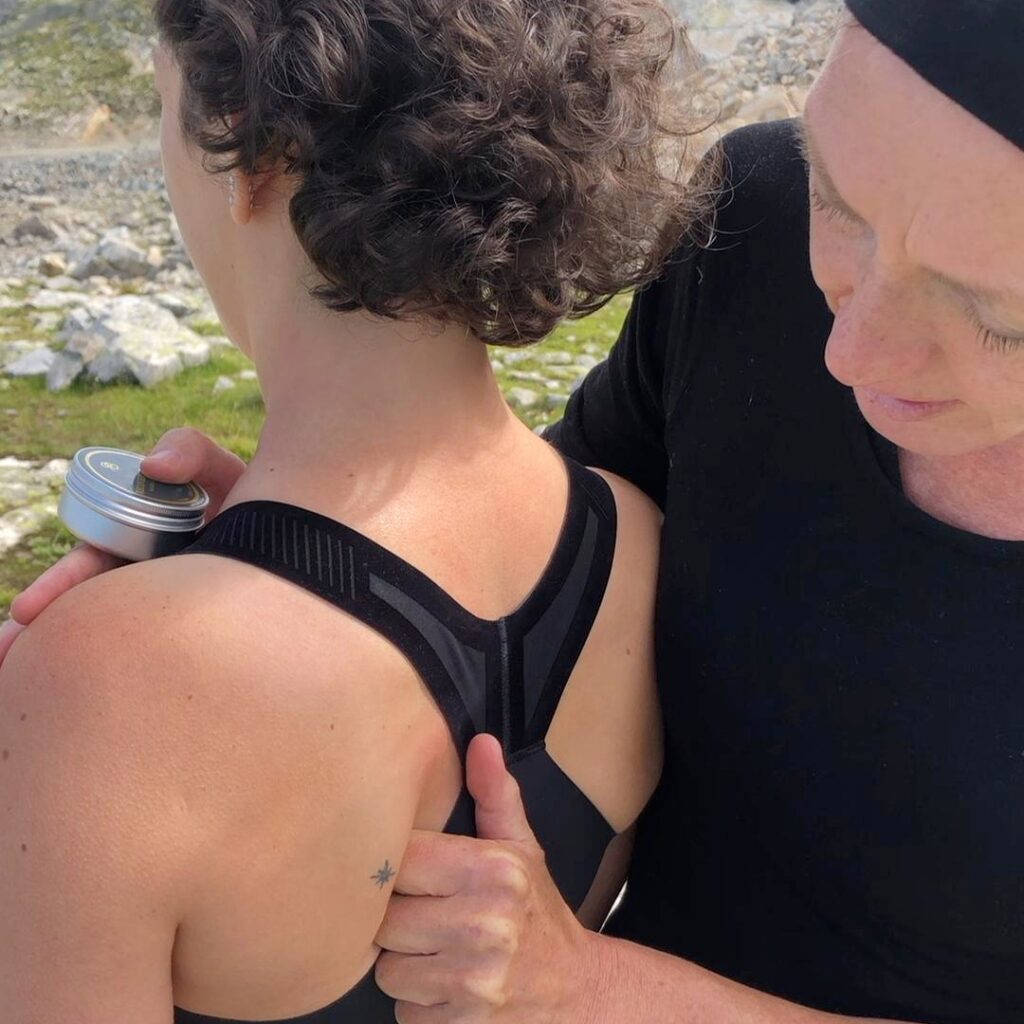
To relieve shoulder pain and tension you can stand to the side of your runner with your arm around the chest for support.
Using the other hand, with Recovery Balm for its anti inflammatory properties, apply pressure with the thumb or knuckles to the sides of the shoulder blade (scapula), making a gentle upward wave movement towards the top of the shoulder.
Releasing Front Line Tension
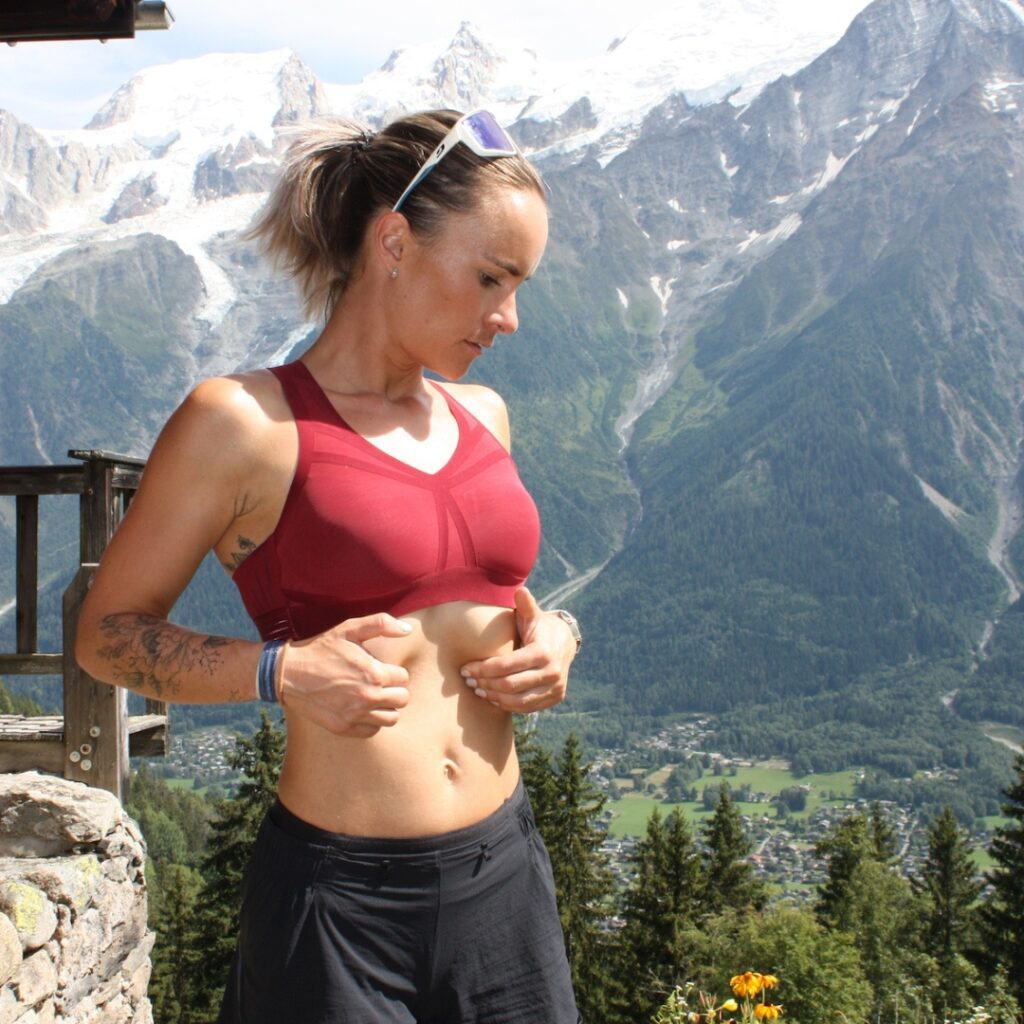
Your running (or desk-time or car-driving) position can cause the front line of fascia to become locked short, so that even if you try to stand up straight, the fascial densification around the diaphragm and psoas will resist and sustain the forward-flex holding pattern.
This can be addressed as such. Standing with your body straight, you can place both hands just under your xiphoid process, at the centre-base of your rib-cage. Then, steadily sweep your hand just under your bottom front ribs towards the outside of your ribcage. This is a superficial fascia release of the diaphragmatic fascia that can help to free up movement and relieve chest tightness, breathing, and posture.
Conclusion
Understanding and implementing a few these massage techniques could perhaps be a game-changer for both seasoned and novice runners.
Equilibrium Massage (@equilibrium.massage.fitness), in collaboration with Hästko sports underwear, has made it simple to learn these techniques, to help runners maintain form throughout the course.
Please enjoy these videos as a useful extra resource, breaking down each technique for easier interpretation.
Don’t miss out on our special live clinic during the UTMB week in Chamonix for more knowledge, hands-on guidance, massage demos and enter the Hastko, Equilibrium, Recovery Balm competition. Watch this space!
Happy running!
D'origine responsable
Sans produits chimiques/parabènes
100% naturel
Vegan
- 15% off your first order when you subscribe
- Free delivery when you spend over €20
Avis des clients
from 60 reviewsTrès bonne qualité
Très bien. Sensation très agréable
Très bonne qualité et pas de risque de casse, son poids est parfait et il est solide
Très utile. Il peut se mettre dans le réfrigérateur si vous voulez avoir un effet froid.
Je recommande
Recovery Balm super bon! Douleurs musculaires apaisées, courbatures soulagées, sommeil réparateur. Rien de plus, rien de moins.
It helps me sleep better
I use it for my chronic back pain. I try to keep up with my busy lifestyle and work schedule.
I have been using the recovery balm for my arthritis pain
It does help soothe the pain, which also allows me to continue doing the things I enjoy,
like playing tennis or long days out with friends and family.
It also helps me sleep more comfortably.
I cannot recommend the recovery balm enough. As someone who exercises regularly, I often experience muscle soreness and fatigue.
However, after incorporating this balm into my post-workout routine, I have noticed a significant difference in my recovery time and muscle pain. It truly is amazing!
Recovery Balm est le seul produit qui m’a aidée à soulager mon mal de dos après une longue journée de travail. Il est facile à appliquer.
Très satisfait
Je recommande ce produit à tous les sportifs qui cherchent à améliorer leur récupération.
Je le recommande, des produits efficaces.
Ce baume est incroyablement efficace pour soulager les douleurs musculaires. Après avoir essayé de nombreux traitements sans succès, j’ai été agréablement surpris de sentir une nette amélioration après avoir utilisé ce produit. Je ne pourrais pas vivre sans maintenant !
